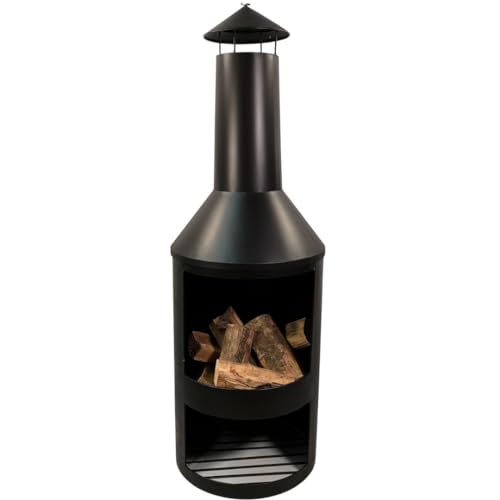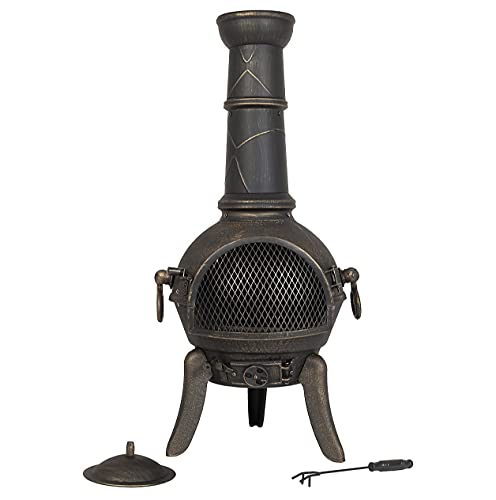20 Fun Facts About Chimineas Sale
Page Information

Content
 Things You Should Know Before Buying a Chiminea
Things You Should Know Before Buying a ChimineaChimineas can be a fantastic addition to your backyard. They can provide warmth and atmosphere. There are a few points you should think about before purchasing one.
Some chimineas, for example emit harmful particles into the air. It is possible to avoid this by using environmentally friendly fuels such as bioethanol fire pits. They require regular maintenance.
The History of the Chiminea
Chimineas bring warmth and a warm glow to outdoor living areas. Chimineas can transform a cold summer evening into an inviting space to relax or entertain family and friends. Chimineas were originally made of clay and other materials. They have evolved over the centuries to meet various practical and aesthetic requirements.
Typically, chimineas feature the shape of a potbelly and a chimney, however they are also available in modern styles with more of an open design. They usually sit on a base that lifts them off the ground and have a wide opening for adding firewood. Some chimineas are plain or unpainted, while others feature painted or raised details.
The first chimineas, constructed of fired clay were used for heating and cooking. As they gained popularity, they were modified to accommodate varying climates, and improvements were made to design and construction techniques making them more durable. Today, chimineas come in various metals, stones, and clays, each with distinct aesthetic and practical benefits.
Depending on which kind of chimineas you select, they may need regular maintenance to keep them in good shape. For instance, clay chimineas are susceptible to cracking and degrading over time if are not properly stored during the winter. Use a clay-specific sealant and apply it every 3 to 6 months to ensure the best protection.
metal chiminea chimineas are more resistant to damage, but they can break if stored improperly. Place them in a case that protects them from the elements, including snow and rain. To prevent it from falling over, place any chiminea on a stable and level surface. It should not be placed in the vicinity of trees or other structures such as a roof of a patio.
Chimineas are heavy and difficult to move. However, it is possible to move smaller clay chimineas between different areas of your yard or garden.
Their Functionality
The outdoor fireplaces were initially created as cooking vessels for Mexican tribes that resided in towns. They are ideal to create a cozy environment. They can also be used as heaters by distributing heat through their chimneys. Their aesthetic versatility allows them to fit into a wide range of styles.
Chimineas are also easy to maintain and manage, which eliminates the need for regular maintenance. Additionally, they last for a long period of time if properly maintained and kept away from extreme weather conditions. The quality of materials and maintenance practices used by homeowners will determine the durability of these products.
Chimineas come in different materials like traditional clay cast iron, steel and clay each with distinct durability and aesthetics. The latter, for instance, have a more polished and refined look that is suitable for contemporary designs. They also retain heat exceptionally well, which makes them ideal as outdoor heating. Additionally, some are made out of sustainable materials, giving an alternative to relying on fossil fuels.
The impact of chimineas' repercussions on air quality is dependent on factors like the time of use, the kind and moisture content of the wood as well as the effectiveness of the chiminea's design. These units emit particulate matter which can be harmful to the health of people and contribute to air pollution. Selecting dry, seasoned wood and using a Chiminea Uk that is efficient in its design can significantly reduce this effect.
Chimineas are enclosed structures that minimise smoke production. They are also designed in a way that smoke is directed upwards to reduce potential health risks and nuisances to neighbours. The open design of firepits could cause a lot of smoke that can affect living areas.
 In the end, the decision between a chiminea and a fire pit is dependent on your personal preferences, the functionality of the fire pits and chimineas pit and budget. Both units are versatile and have a distinctive design, but chimineas are a excellent option for those who want to create a cozy atmosphere with little effort. They are also simpler to manage once they've been warmed up due to their specialised design, making them a convenient alternative to outdoor fireplaces.
In the end, the decision between a chiminea and a fire pit is dependent on your personal preferences, the functionality of the fire pits and chimineas pit and budget. Both units are versatile and have a distinctive design, but chimineas are a excellent option for those who want to create a cozy atmosphere with little effort. They are also simpler to manage once they've been warmed up due to their specialised design, making them a convenient alternative to outdoor fireplaces.Materials
Chimineas are available in a variety of styles to suit all tastes. They usually have an open-top potbelly that tapers into a chimney. They can be made of clay, metal, or cast iron. They're a great addition to any deck or patio that you have in your backyard. They can create ambiance and light while also providing warmth, which allows you to spend more time outdoors. Chimineas are commonly employed as a substitute for fire pits because they offer more visual appeal and do a better job of funneling smoke away from people who are seated around it.
Clay chimineas are made by hand, using local raw clay. They are then fired in a kiln to burn off any leftover materials and create a hard water-resistant surface. Then, they are coated with an anti-corrosive glaze that decreases the chance of them breaking or warping. A chiminea can be stored outdoors all year long with the exception of extreme weather. If it is kept outdoors, the clay must be covered and protected with the chiminea grill.
A chiminea that is made of clay, metal, or cast iron, will bring a rustic, elegant look to your patio. They are built to withstand extreme temperatures, making them ideal for cooking, and they come in a variety sizes. Some are even equipped with a removable bbq and chiminea grill.
Before purchasing a chiminea make sure that it is safe to use and has the proper ventilation. It is important that you place it on a non-flammable surface, like concrete patios or bricks. It should not be placed on an overhang like pergolas or roofs. It is important not to make use of water to extinguish the flames, as the sudden temperature fluctuations can cause cracks in clay and terracotta.
Although chimineas are able to withstand temperatures outside, they should be broken down slowly by starting small fires, and then increasing the size of the fire slowly. It is also a good idea to regularly clean your chiminea by using an outdoor wood cleaner to prevent ash build-up and rust.
Environmental Impact
Chimineas can add warmth and ambience to outdoor spaces, but their use can create harmful gases. The burning of wood in chimineas emits carbon monoxide, a dangerous gas that is smellless and inert and can cause a variety of health issues, including respiratory issues.
This gas is especially dangerous in enclosed structures like Chimineas, where it can build up to toxic levels. Carbon monoxide poisoning can lead to unconsciousness or death. It is also a significant cause of global warming and air pollution and that's why it is essential to keep chimineas away from the outdoors and away from anything flammable.
Apart from carbon monoxide, chimineas can also emit particulate matter (PM2.5) and other harmful pollutants. The size of the chiminea as well as the type of fuel used affect the quantity of emissions. Dry wood fuels emit less emissions than wet logs. A chiminea fitted with a spark-resistor can reduce smoke and PM2.5 emissions.
Despite the fact that chimineas are always changing, their classic look -- a potbelly base with an elongated fireplacehas remained the same. This balance of design, innovation, and preservation is what makes Chimineas so popular across Europe and all over the world.
Modern chimineas come in a variety of styles and materials that can be adapted to any garden design. While clay chimineas are still popular, many people opt for metal versions that offer greater durability and weather resistance. They are made of cast iron, cast aluminum and even stainless steel. They can be formed in a variety of styles to fit different tastes.
There are also slim and linear designs that do not compromise on functionality. But, it's important to keep in mind that a chiminea made from metal will require more frequent maintenance and care than clay models, as it will be subject to thermal shock every time you start it up.
When you are choosing a chiminea it is recommended that you read the manufacturer's instructions carefully before starting the fire. It is also recommended to buy an enclosure for your chiminea when not in use to prevent any water damage or buildup of dust. It is also essential to regularly clean your chiminea and remove any ash before you begin to build the fire again.
- Previous3 Ways The Chimineas Can Influence Your Life 24.10.27
- Next10 Key Factors About Large Clay Chimineas For Sale You Didn't Learn In The Classroom 24.10.27
Comment list
There are no registered comments.
